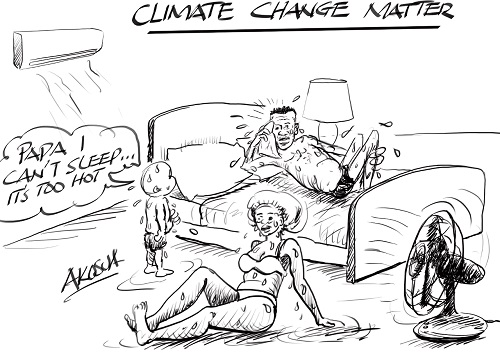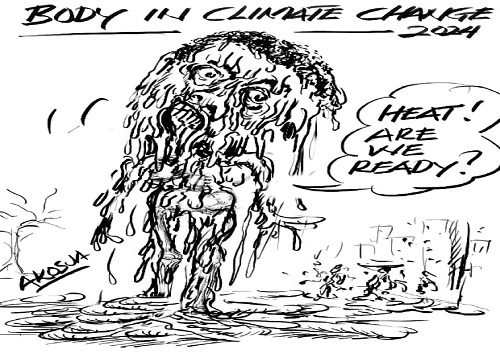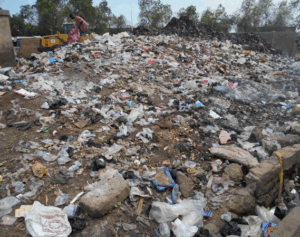


Across Africa’s vibrant landscapes, from the teeming marketplaces to the serene rural farmlands, women stand as the unwavering pillars of their communities. They dedicate their lives to nurturing the land, crafting essential goods, and building sustainable businesses under the relentless African sun. However, with each passing day, the intensifying heat poses a significant threat to their health, their livelihoods, and the well-being of their families. For these resilient women, climate change transcends the realm of environmental concern and becomes a deeply personal struggle.
A beacon of hope
Amid these challenges, the PALM-TREEs Project, an innovative initiative spearheaded by Sustainable Solutions for Africa (SSA), emerges as a beacon of hope. Recognizing the urgent need to understand the human impact of extreme weather events, the project collaborates closely with women and marginalized communities. This collaborative approach ensures the development of climate-resilient solutions that prioritize the unique needs of these populations and amplify their often-unheard voices. A pivotal moment for the project occurred in January 2025, with a comprehensive training programme held at Accra’s Airport View Hotel.
Laying the groundwork for change
During the intensive training program, enumerators underwent rigorous preparation, mastering the installation of i-buttons and the administration of household questionnaires. These meticulous steps were crucial in laying a solid foundation for the upcoming data collection phase, underscoring the project’s commitment to accuracy and comprehensive understanding.
Addressing the assembled researchers, Namo Lawson, a representative of Sustainable Solutions for Africa (SSA), emphasized the critical importance of precise terminology in their investigative work. She articulated that the core aim of the research is to reveal the nuanced ways in which climate impacts vary across individuals, influenced by a complex interplay of factors such as socioeconomic status, geographical location, personal identity, and the strength of community connections. “This focus on intersectionality ensures a more accurate and relevant understanding of the challenges faced,” Ms. Lawson said.
Unveiling the impact of heat stress on women
Building upon the project’s overarching goal, Rachel Yeboah Nketiah, a doctoral candidate at the University of Energy and Natural Resources (UENR), presented a compelling study focusing on the impact of heat stress on women in Accra and their adaptive coping mechanisms.
Her research, informed by a detailed heat risk map of Accra, gathered critical data from nine vulnerable communities identified as the most affected by extreme heat: James Town, Mallam Atta, Darkuman, Nima, Kanda, Chorkor, Mamobi, Accra New Town, and Kotobabi. “These communities are anticipated to provide invaluable insights into the specific impact of heat stress on women and highlight the diverse adaptation strategies they employ,” she said.
Methodology and deployment strategies
Further elaborating on the project’s rigorous approach, Mr. Francis Balo, representing Sustainable Solutions for Africa (SSA), provided detailed information regarding the sample size allocation for each community. He then presented a comprehensive overview of the questionnaire’s framework, outlining the specific tools and techniques employed for field data collection.
Prior to the actual deployment, the team conducted thorough simulation exercises, testing the installation of i-button sensors across 27 small business centers and households to ensure accuracy and efficiency in the data collection process.
Striving for an equitable and sustainable future
The PALM-TREEs Project, through its meticulous research and community-centered approach, is dedicated to investigating the multifaceted impact of climate change on women in Accra, Ghana. By highlighting the disproportionate effects of heat stress on women’s health, livelihoods, and overall well-being, the project aligns its goals with the UN’s Sustainable Development Goals (SDGs 3, 5, and 13).
Ultimately, the project aspires to inform the development of effective climate-resilient solutions and amplify the voices of women, fostering a more equitable and sustainable future for all. In recognizing that climate change magnifies existing gender inequalities, particularly impacting women in roles such as water collection and smallholder farming, the project aims to address the core issues at hand. By empowering women to adapt to the changing climate, the PALM-TREEs Project contributes to a future where women can thrive despite the increasing environmental challenges.
By Afia Agyapomaa Ofosu
The post Accra’s heat crisis: How climate change threatens women’s lives appeared first on Ghana Business News.
Read Full Story














Facebook
Twitter
Pinterest
Instagram
Google+
YouTube
LinkedIn
RSS